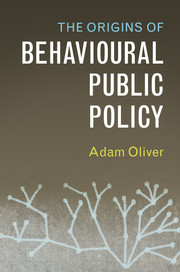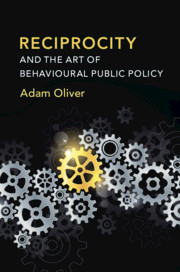The Origins of Behavioural Public Policy
The use of behavioural science to inform policy is one of the main developments in the social sciences over the last several decades. In this book, Adam Oliver offers an accessible introduction to the development of behavioural public policy, examining how behavioural economics might be used to inform the design of a broad spectrum of policy frameworks, from nudges, to bans on certain individual behaviours, to the regulation of the commercial sector. He also considers how behavioural economics can explain and predict phenomena as a challenge to economists' assumptions around how people perceive time, utility and money. The book offers an intellectual foundation for all those concerned with behavioural public policy, from academics, undergraduate and postgraduate students with a diverse range of disciplinary perspectives, such as economics, political science, sociology and anthropology, to policy makers and practitioners working directly with behavioural public policy in their everyday working lives.
- An accessible introduction to the development of behavioural economics from the 1950s to the present day, giving the reader a thorough grounding in its developments and the challenges it poses to rational choice theory and standard economics theory
- Offers an all-encompassing, non-didactic approach to behavioural economics, presenting arguments both for and against propositions, allowing the reader to gain knowledge of the various issues and encouraging them to form their own considered opinions
- Clearly highlights an applied approach to behavioural economics over the rhetoric of other texts to bring a level of intellectual clarity to the field
Reviews & endorsements
'An accessible, up-to-date, and concise introduction to the history, intellectual background and current state of behavioural public policy. An ideal entry point to the field for academics, policy makers and the informed general reader.' Nick Chater, University of Warwick
'Taking off from the theoretical bases of behavioural economics, Adam Oliver illustrates its application to public policy with fascinating examples, largely regarding health care. The Origins of Behavioural Public Policy is for everyone: from novices in the field to experts who previously thought they knew everything about it.' George Akerlof, Winner of the 2001 Nobel Prize for Economic Sciences
'Adam Oliver’s The Origins of Behavioural Public Policy is an impressive and rigorous introduction to an increasingly influential approach to policy design. The book is ideally suited to informed readers who wish to gain a more scholarly understanding of BPP, beyond the level of popular science. It will prove especially valuable to both undergraduate and graduate students aiming to gain knowledge of the central theoretical and empirical building blocks of BPP. It will also be of benefit to policymakers who are interested in a concise but detailed overview of the emergence of the approach, as well as an insightful resource on the potential future development of BPP as a productive form of policy intervention.' Ross James Gildea, Journal of Politics and Life Sciences
Product details
June 2017Hardback
9781316510261
210 pages
235 × 156 × 18 mm
0.43kg
Available
Table of Contents
- Preface
- 1. Assuming rationality
- 2. Challenging rationality
- 3. Describing risky behaviours
- 4. About time
- 5. Experiencing and remembering
- 6. Motivational crowding
- 7. Nudges
- 8. Shoves and budges
- 9. Give and take
- 10. Summing up
- Note on references
- Bibliography.








